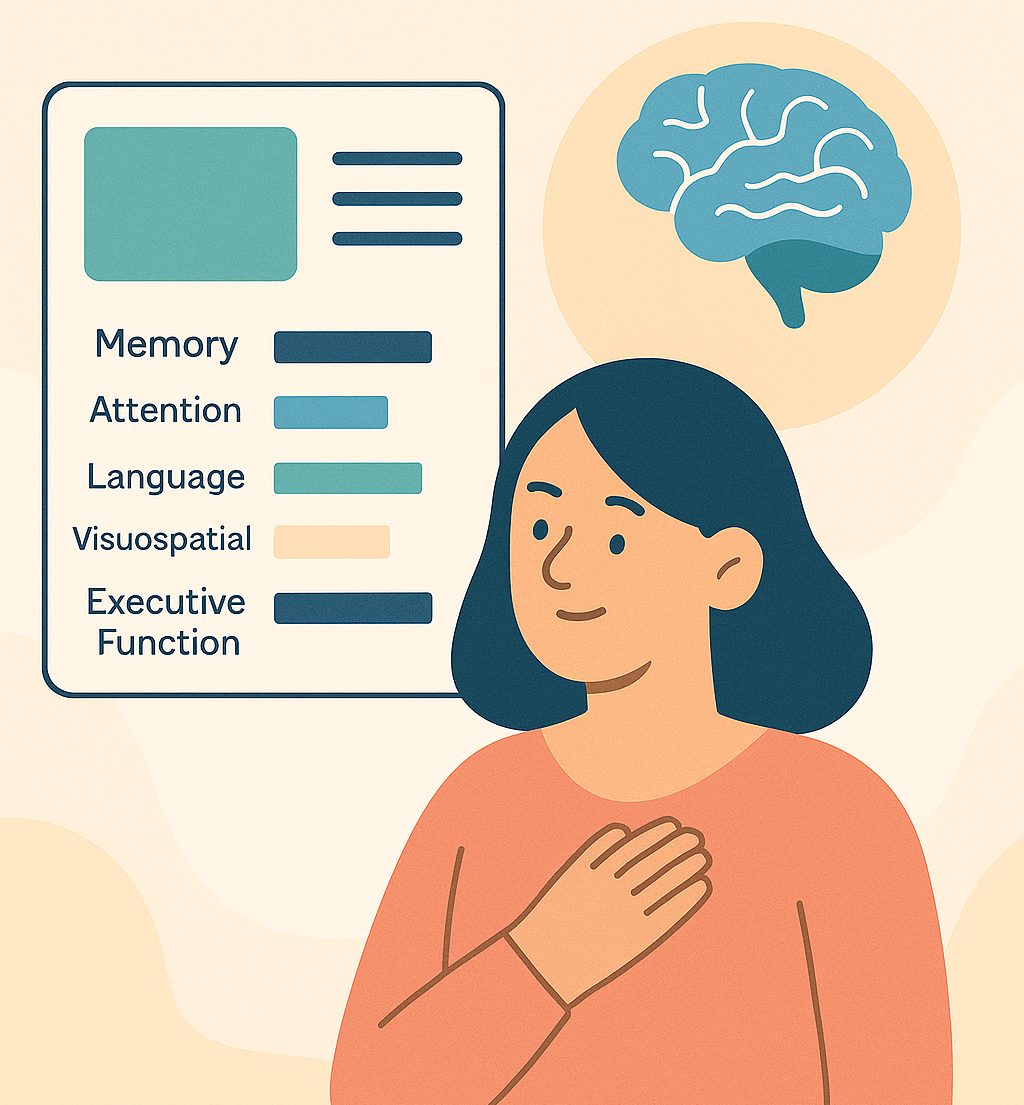
Welcome!
Your brain is one of the most important parts of who you are. It helps you think, feel, plan, and connect with others. It's normal to wonder about how your brain is doing - and to want to keep it as healthy as possible.
This page will help you understand what your neurocognitive test results mean and how they can guide you. Remember: this report is just one piece of your brain health story - it does not define you.
1. What This Report Shows
Your brain works through many connected systems. Neurocognitive testing checks how well each system is doing its job. Your results show how your thinking skills are working right now, compared to what's expected for your age, education, and background.
The Main Areas This Report Looks At
- Memory
How well you can learn, store, and remember information - both short-term and long-term. - Attention
How well you can focus, stay on task, and switch focus when needed. Good attention helps you follow conversations and complete daily activities. - Language
Your ability to understand and use words - including naming objects, finding the right words, and following what others say. - Visuospatial Skills
How well you see, understand, and navigate shapes, spaces, and directions. These skills help you read a map, park a car, or put together a puzzle. - Executive Function
Your brain's “manager.†This helps you plan, organize, make decisions, solve problems, and control your behavior and emotions.
All of these skills work together, like instruments in an orchestra. If one section plays out of tune, it can affect the whole performance - but your brain can often adapt by using other areas to help.
2. What Do the Scores Mean?
Your scores compare your results to other people with a similar background.
Here's what each category means:
- Normal
Your performance is within the expected range. No significant concerns in this area. - Borderline
Your score is slightly below the expected range. This may show mild challenges, but does not always mean there is a disease. Stress, sleep, mood, or pain can affect scores. - Mild Cognitive Impairment
Your score suggests noticeable difficulties in this area compared to peers. It may be helpful to monitor these changes or do more evaluation, especially if it affects daily life. - Major Cognitive Impairment
Your performance is significantly below what would be expected. This shows more serious challenges that can impact daily activities. A full care plan may be needed.
One low score does not mean you have dementia. Doctors look at patterns across all areas and compare them to what you notice day to day.
3. Why Patterns Matter
No single test tells the whole story. Your doctor looks for patterns, such as:
- Are the changes mild, moderate, or severe?
- Do they affect just one area (like memory) or many areas?
- Do they explain what you or your family notice in daily life?
For example, if you have trouble planning and organizing but your memory is strong, your doctor may help you find strategies to support your executive skills.
Patterns help your healthcare team decide if you need more tests, lifestyle changes, or treatments.
4. What Should I Do Next?
Talk to Your Healthcare Provider
They know you best. Bring up any questions and talk about what you or your loved ones have noticed at home, work, or school.
Monitor Changes Over Time
Your results are a snapshot in time. Retesting every year or every few years can help track changes and catch problems early.
Share With Family or Someone You Trust
You may want to share this report with a family member or trusted friend. They can help you notice changes and support you.
5. Take Care of Your Brain
- Healthy habits help protect your brain. Here are some ideas:
- Get enough sleep every night.
- Be physically active - walking, dancing, or exercise classes help your brain too.\
- Eat a balanced diet, like the Mediterranean diet.
- Stay mentally active - read, do puzzles, play music, or learn new skills.
- Stay connected with friends and family.
- Manage health conditions like high blood pressure, diabetes, or depression.
- Keep stress low - hobbies, mindfulness, and staying engaged can help.
Do what brings you joy - staying curious and connected matters!
6. What to Watch For
Pay attention if you or your family notice changes like:
Forgetting appointments or conversations more often.
Repeating questions a lot.
Getting lost in familiar places.
Trouble managing money or medications.
These may be signs to share with your doctor.
7. Common Questions
Q: Can stress or mood affect my scores?
A: Yes! Anxiety, depression, poor sleep, or pain can all lower your scores. It's important to treat these too.
Q: Does a low score mean I have dementia?
A: Not by itself. Doctors never diagnose dementia on one score alone - they use the full pattern, your story, and sometimes brain scans or other tests.
Q: When should I follow up?
A: Talk with your doctor about when to test again. Many people check once a year or every few years.
8. A Final Note: You're Not Alone
Your neurocognitive report is just one piece of your brain health puzzle. Be kind to yourself. Everyone's brain changes over time. With support and healthy habits, you can help protect your brain for years to come.
Stay curious. Stay connected. Stay hopeful.

